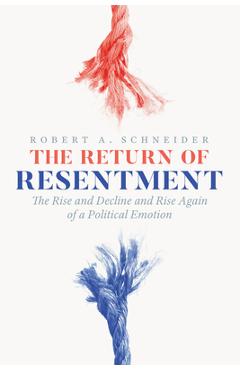The Return of Resentment: The Rise and Decline and Rise Again of a Political Emotion - Robert A. Schneider

Detalii The Return of Resentment: The
libris.ro
183.6 Lei
204 Lei
Language Arts & Disciplines
Robert A. Schneider
The Return of Resentment: The - Disponibil la libris.ro
Pe YEO găsești The Return of Resentment: The de la Robert A. Schneider, în categoria Language Arts & Disciplines.
Indiferent de nevoile tale, The Return of Resentment: The Rise and Decline and Rise Again of a Political Emotion - Robert A. Schneider din categoria Language Arts & Disciplines îți poate aduce un echilibru perfect între calitate și preț, cu avantaje practice și moderne.
Preț: 183.6 Lei
Caracteristicile produsului The Return of Resentment: The
- Brand: Robert A. Schneider
- Categoria: Language Arts & Disciplines
- Magazin: libris.ro
- Ultima actualizare: 28-10-2025 01:22:05
Comandă The Return of Resentment: The Online, Simplu și Rapid
Prin intermediul platformei YEO, poți comanda The Return of Resentment: The de la libris.ro rapid și în siguranță. Bucură-te de o experiență de cumpărături online optimizată și descoperă cele mai bune oferte actualizate constant.
Descriere magazin:
Charts the long history of resentment, from its emergence to its establishment as the word of the moment. The term resentment, often casually paired with words like hatred, rage, and fear, has dominated US news analysis since November 2016. Despite its increased use, this word seems to defy easy categorization. Does resentment describe many interlocking sentiments, or is it just another way of saying anger? Does it suggest an irrational grievance, as opposed to a legitimate callout of injustice? Does it imply political leanings, or is it nonpartisan by nature? In The Return of Resentment , Robert A. Schneider explores these questions and more, moving from eighteenth-century Britain to the aftermath of the French Revolution to social movements throughout the twentieth century. Drawing on a wide range of writers, thinkers, and historical experiences, Schneider illustrates how resentment has morphed across time, coming to express a collective sentiment felt by people and movements across the political spectrum. In this history, we discover resentment\'s modernity and its ambiguity--how it can be used to dismiss legitimate critique and explain away violence, but also convey a moral stance that demands recognition. Schneider anatomizes the many ways resentment has been used to label present-day movements, from followers of Trump and supporters of Brexit to radical Islamicists and proponents of identity politics. Addressing our contemporary political situation in a novel way, The Return of Resentment challenges us to think critically about the roles different emotions play in politics.

Produse asemănătoare

Puzzle Ravensburger Lord Of The Rings Return of the King 2000pc (10217293)
![]() buygames.net
buygames.net
Actualizat in 31/10/2025
134.63 Lei

Fans Vintage Collection Star Wars Return Of The Jedi Nikto Skiff Guard 10cm F7337
![]() buygames.net
buygames.net
Actualizat in 31/10/2025
40.81 Lei

Star Wars Return Of The Jedi Kithaba Skiff Guard 10cm F7338
![]() buygames.net
buygames.net
Actualizat in 31/10/2025
40.81 Lei

Star Wars Return of the Jedi Retro Collection Lando Calrissian Skiff Guard 10cm F7277
![]() buygames.net
buygames.net
Actualizat in 31/10/2025
34.65 Lei

Star Wars The Black Series Return of The Jedi 40th Anniversary Princess Leia Endor F7051
![]() buygames.net
buygames.net
Actualizat in 31/10/2025
56.16 Lei
Produse marca Robert A. Schneider

The Return of Resentment: The Rise and Decline and Rise Again of a Political Emotion - Robert A. Schneider
![]() libris.ro
libris.ro
Actualizat in 28/10/2025
183.6 Lei
